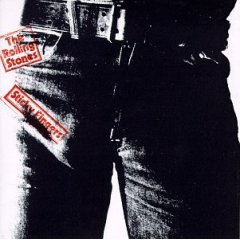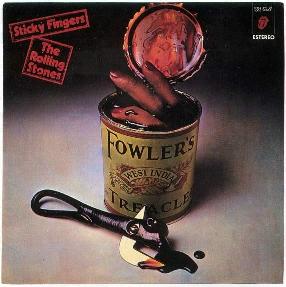- Sticky Fingers
Infobox Album
Name = Sticky Fingers
Type = studio
Artist =The Rolling Stones

Released = 23 April 1971
Recorded =Muscle Shoals Sound Studio andOlympic Studios , 2 – 4 December 1969
17 February 1970,
March – May 1970,
16 June – 27 July 1970
17 – 31 October 1970, January 1971, except
"Sister Morphine ": begun 22 – 31 March 1969
Genre = Rock
Length = 46:25
Label = Rolling Stones, Atlantic
Producer = Jimmy Miller
Reviews =
*Allmusic Rating|5|5 [http://www.allmusic.com/cg/amg.dll?p=amg&sql=Abe3ibkj96akc link]
*BBC (favourable) [http://www.bbc.co.uk/music/release/4pzf/ link]
*Robert Christgau (A) [http://www.robertchristgau.com/get_artist.php?name=rolling+stone link]
*"NME " Rating|9|10 (7/9/94, p.43)
*"Rolling Stone " (mixed) [http://www.rollingstone.com/artists/therollingstones/albums/album/99494/review/6068307/sticky_fingers 6/10/71]
*Yahoo! Music (favourable) [http://music.yahoo.com/read/review/12036279 1/01/71]
Last album = "Get Yer Ya-Ya's Out! The Rolling Stones in Concert "
(1970)
This album = "Sticky Fingers"
(1971)
Next album = "Exile on Main St. "
(1972)
Misc = Extra album cover 2
Upper caption = Alternate cover
Type = studio

Lower caption = Cover of Spanish edition"Sticky Fingers" is an album by English rock band
The Rolling Stones , released in April 1971. It is the band's first release on the band's newly-formed label,Rolling Stones Records , after having been contracted since 1963 withDecca Records in the UK andLondon Records in the US. It is alsoMick Taylor 's first full-length appearance on a Rolling Stones album.Recording and release
Although sessions for "Sticky Fingers" began in earnest in March 1970, they had done some early recording at Muscle Shoals Studios in
Alabama in December 1969 and "Sister Morphine ", cut during "Let It Bleed "'s sessions earlier in March of that year, was held over for this release. Much of the recording for "Sticky Fingers" was effected with The Rolling Stones' mobile studio unit inStargroves during the summer and fall months in 1970. Early versions of songs that would appear on "Exile on Main St. " were also routined during these sessions.With the end of their Decca/London association at hand, The Rolling Stones would finally be free to release their albums (cover art and all) as they pleased. However, soon-to-be-ex-manager
Allen Klein (who took over the reins fromAndrew Loog Oldham in 1965 so that Oldham could concentrate on producing the band), dealt the group a major blow when they discovered - to their horror - that they had inadvertently signed over their entire 1960s copyrights to Klein and his company ABKCO, which is how all of their material from 1963's "Come On" to "Get Yer Ya-Ya's Out! The Rolling Stones in Concert " has since come to be released by ABKCO Records. The band would remain incensed with Klein for decades over the swindle.When Decca informed The Rolling Stones that they were owed one more single, they cheekily submitted a track called "Cocksucker Blues" - which was guaranteed to be refused. Instead, Decca released the two-year-old "
Beggars Banquet " track "Street Fighting Man " while Allen Klein would have dual copyright ownership - with The Rolling Stones - of "Brown Sugar" and "Wild Horses".Cover
The artwork for "Sticky Fingers" - which features a working zipper that opened to reveal a man in cotton briefs (rubber stamped "THIS PHOTOGRAPH MAY NOT BE-ETC.") - was conceived by American
pop art istAndy Warhol , photographed byBilly Name and designed byJohn Pasche . The cover features the lower torso of either Warhol assistant Jed Johnson [ [http://www.superseventies.com/ac2stickyfingers.html] superseventies.com] orJoe Dallesandro [ [http://www.joedallesandro.com/Dallewho.htm] Joe Dallesandro.com] in a pair of tight jeans. After retailers complained that the zipper was causing damage to the vinyl (from stacked shipments of the record), the zipper was "unzipped" slightly to the middle of the record, where damage would be minimized. The album features the first usage of the "Tongue and Lip Design" designed byJohn Pasche . In Spain the original cover was replaced with a "Can of fingers" cover, and "Sister Morphine " was replaced by theChuck Berry composition "Let it Rock".In 2003 the
TV network VH1 named "Sticky Fingers" the "No.1 Greatest Album Cover" of all time. In 2003, "Sticky Fingers" was listed as number 63 on theList of Rolling Stone's 500 Greatest Albums of All Time .Track listing
All songs written by
Jagger/Richards , except where noted.#"Brown Sugar" – 3:50
#"Sway" – 3:52
#"Wild Horses" – 5:44
#"Can't You Hear Me Knocking " – 7:15
#"You Gotta Move" (Fred McDowell /Rev. Gary Davis ) – 2:34
#"Bitch" – 3:37
#"I Got the Blues " – 3:54
#"Sister Morphine " (Jagger/Richards/Marianne Faithfull ) – 5:34
#"Dead Flowers " – 4:05
#"Moonlight Mile" – 5:56Personnel
*
Mick Jagger – vocals, acoustic guitar, backing vocals, guitar, percussion
*Keith Richards – backing vocals, electric guitar, acoustic guitar, vocals, guitar
*Mick Taylor – electric guitar, guitar, acoustic guitar, slide guitar
*Charlie Watts – drums
*Bill Wyman – bass, electric pianoAdditional personnel
* Ian Stewart – piano
*Nicky Hopkins – piano
*Bobby Keys – saxophone
*Pete Townshend - vocals
*Ronnie Lane - vocals
*Billy Nicholls - vocals
*Jim Price – trumpet, piano
*Billy Preston – organ
*Jim Dickinson – piano
* Rocky Dijon – congas
*Jack Nitzsche – piano
*Ry Cooder – slide guitar
*Jimmy Miller – percussion
*Paul Buckmaster – string arrangementCharts
Album
ingles
References
succession box
before = "4 Way Street " by Crosby, Stills, Nash & Young
title = "Billboard" 200 number-one album
years = 22 May - 18 June 1971
after = "Tapestry" byCarole King succession box
before = "Cocker Happy " byJoe Cocker
title = Australian Kent Music Report number-one album
years = 26 July - 8 August 1971
after = "Daddy Who? ... Daddy Cool" by Daddy Cool
Wikimedia Foundation. 2010.
